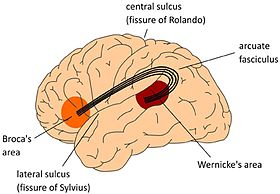Global aphasia
| Global aphasia | |
|---|---|

Global aphasia occurs due to a lesion in the perisylvian cortex, including Broca's and Wernike's areas.
|
Global aphasia, like all forms of aphasia, is a type of language disorder caused by damage to the brain. Global aphasia is a severe form of nonfluent aphasia that affects both receptive and expressive language skills. Severe, acquired impairments of communicative abilities are present across all language modalities, and often no single communicative modality is notably better than another. Specifically, global aphasia leads to severe impairment of production, comprehension, and repetition of language. Patients with global aphasia are unable to speak much; they may be able to say a few short utterances, but their overall production ability is very poor. Furthermore, patients with global aphasia have an extremely impaired ability to understand what others say. Lastly, those with global aphasia are almost fully incapable of repeating words and utterances. This type of aphasia often results from a large lesion of the left perisylvian cortex and is associated with damage to Broca's area, Wernicke's area, and insular regions which are associated with aspects of language. Global aphasia profoundly impairs oral and written language production as well as auditory and written comprehension, yet a person with global aphasia may still be able to express themselves through facial expressions, gestures and intonation.
The general signs and/or symptoms of global aphasia include the inability to comprehend speech, the inability to form speech, and the inability to repeat the speech one has heard. Also, reading and writing are very difficult for individuals with global aphasia. Global aphasia can be more severe in some patients than others; while one patient may not be able to speak at all, another patient may be able to make a few small utterances. It is most common for the onset of global aphasia to occur after a stroke.
Persons with global aphasia can neither read nor write, have poor word retrieval, repetition, and comprehension skills. Additionally, auditory comprehension and speech are severely limited. Persons with global aphasia are often mute or unable to say more than a few words or sounds, such as "hi" or "yes". Performance of nonverbal tasks can range from satisfactory to normal. However, it is possible for those affected by global aphasia to be able to express themselves using facial expressions, intonation, and gestures. Most persons with global aphasia are unable to functionally read sentences and usually cannot even read simple words. Extensive lexical impairment is also noted. Global aphasia is usually accompanied by weakness of the right side of the face and right hemiplegia but can occur with or without hemiparesis. Additionally, it is common for an individual with global aphasia to have one or more of the following, additional impairments: apraxia of speech, alexia, pure word deafness, agraphia, facial apraxia, and depression.
...
Wikipedia
